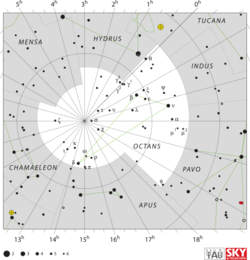Astronomy:Eta Octantis
| Observation data Equinox J2000.0]] (ICRS) | |
|---|---|
| Constellation | Octans |
| Right ascension | 10h 59m 13.7578s[1] |
| Declination | −84° 35′ 38.0177″[1] |
| Apparent magnitude (V) | 6.18±0.01[2] |
| Characteristics | |
| Evolutionary stage | main sequence[3] |
| Spectral type | A1 Va[4] |
| U−B color index | +0.12[5] |
| B−V color index | +0.11[5] |
| Astrometry | |
| Radial velocity (Rv) | −1.7±0.6[6] km/s |
| Proper motion (μ) | RA: −65.747[1] mas/yr Dec.: −8.273[1] mas/yr |
| Parallax (π) | 9.1133 ± 0.02[1] mas |
| Distance | 357.9 ± 0.8 ly (109.7 ± 0.2 pc) |
| Absolute magnitude (MV) | +1.08[7] |
| Details | |
| Mass | 2.37±0.03[3] M☉ |
| Radius | 2.6±0.1[8] R☉ |
| Luminosity | 45.3+3.1 −3.0[3] L☉ |
| Surface gravity (log g) | 4.1[9] cgs |
| Temperature | 9,500[9] K |
| Metallicity [Fe/H] | −0.01[10] dex |
| Rotational velocity (v sin i) | 152±13[11] km/s |
| Age | 547[10] Myr |
| Other designations | |
| Database references | |
| SIMBAD | data |
Eta Octantis, Latinized from η Octantis, is a solitary star located in the southern circumpolar constellation Octans. It has an apparent magnitude of 6.19,[2] making it faintly visible to the naked eye. The object is situated at a distance of 358 light years[1] but is approaching the Solar System with a heliocentric radial velocity of −1.7 km/s.[6]
Eta Octantis has a stellar classification of A1 Va,[4] indicating that it is an ordinary A-type main sequence star. At present it has 2.37 times the Sun's mass[3] and 2.6 times the Sun's radius.[8] It shines with a luminosity of 45 solar luminosity[3] from its photosphere at an effective temperature of 9,500 K, giving a white hue.[9] Eta Octantis is a rapidly rotating star, with a projected rotational velocity of 152 km/s,[11] and is estimated to be 547 million years old,[10] having completed 72% of its main sequence lifetime.[3]
References
- ↑ 1.0 1.1 1.2 1.3 1.4 Brown, A. G. A. (2021). "Gaia Early Data Release 3: Summary of the contents and survey properties". Astronomy & Astrophysics 649: A1. doi:10.1051/0004-6361/202039657. Bibcode: 2021A&A...649A...1G. Gaia EDR3 record for this source at VizieR.
- ↑ 2.0 2.1 Høg, E.; Fabricius, C.; Makarov, V. V.; Urban, S.; Corbin, T.; Wycoff, G.; Bastian, U.; Schwekendiek, P. et al. (March 2000). "The Tycho-2 catalogue of the 2.5 million brightest stars". Astronomy and Astrophysics 355: L27–L30. ISSN 0004-6361. Bibcode: 2000A&A...355L..27H.
- ↑ 3.0 3.1 3.2 3.3 3.4 3.5 Zorec, J.; Royer, F. (1 January 2012). "Rotational velocities of A-type stars. IV. Evolution of rotational velocities". Astronomy and Astrophysics 537: A120. doi:10.1051/0004-6361/201117691. ISSN 0004-6361. Bibcode: 2012A&A...537A.120Z.
- ↑ 4.0 4.1 Paunzen, E.; Duffee, B.; Heiter, U.; Kuschnig, R.; Weiss, W. W. (July 2001). "A spectroscopic survey for λ Bootis stars". Astronomy & Astrophysics 373 (2): 625–632. doi:10.1051/0004-6361:20010630. ISSN 0004-6361. Bibcode: 2001A&A...373..625P.
- ↑ 5.0 5.1 Johnson, H. L.; Mitchell, R. I.; Iriarte, B.; Wisniewski, W. Z. (1966). "UBVRIJKL Photometry of the Bright Stars". Communications of the Lunar and Planetary Laboratory 4: 99–110. Bibcode: 1966CoLPL...4...99J.
- ↑ 6.0 6.1 Gontcharov, G. A. (November 2006). "Pulkovo Compilation of Radial Velocities for 35 495 Hipparcos stars in a common system". Astronomy Letters 32 (11): 759–771. doi:10.1134/S1063773706110065. ISSN 1063-7737. Bibcode: 2006AstL...32..759G.
- ↑ Anderson, E.; Francis, Ch. (May 2012). "XHIP: An extended hipparcos compilation" (in en). Astronomy Letters 38 (5): 331–346. doi:10.1134/S1063773712050015. ISSN 1063-7737. Bibcode: 2012AstL...38..331A.
- ↑ 8.0 8.1 Stassun, Keivan G. et al. (9 September 2019). "The Revised TESS Input Catalog and Candidate Target List". The Astronomical Journal 158 (4): 138. doi:10.3847/1538-3881/ab3467. ISSN 0004-6256. Bibcode: 2019AJ....158..138S.
- ↑ 9.0 9.1 9.2 Lafrasse, Sylvain; Mella, Guillaume; Bonneau, Daniel; Duvert, Gilles; Delfosse, Xavier; Chesneau, Olivier; Chelli, Alain (16 July 2010). "Building the 'JMMC Stellar Diameters Catalog' using SearchCal". Optical and Infrared Interferometry II. 7734. pp. 77344E. doi:10.1117/12.857024. Bibcode: 2010SPIE.7734E..4EL.
- ↑ 10.0 10.1 10.2 Gontcharov, G. A. (December 2012). "Dependence of kinematics on the age of stars in the solar neighborhood". Astronomy Letters 38 (12): 771–782. doi:10.1134/S1063773712120031. ISSN 0320-0108. Bibcode: 2012AstL...38..771G.
- ↑ 11.0 11.1 Reiners, A.; Royer, F. (February 2004). "First signatures of strong differential rotation in A-type stars". Astronomy & Astrophysics 415 (1): 325–329. doi:10.1051/0004-6361:20034175. ISSN 0004-6361. Bibcode: 2004A&A...415..325R.
- ↑ "eta Oct". SIMBAD. Centre de données astronomiques de Strasbourg. http://simbad.u-strasbg.fr/simbad/sim-basic?Ident=eta+Oct.
<ref> tag with name "Gould1879" defined in <references> is not used in prior text.
 |


